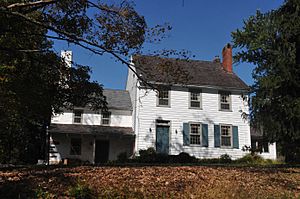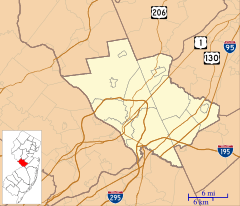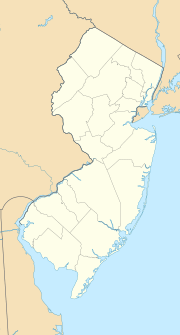Pleasant Valley, Mercer County, New Jersey facts for kids
Quick facts for kids
Pleasant Valley, New Jersey
|
|
|---|---|

Historic house in Pleasant Valley
|
|
| Country | |
| State | |
| County | Mercer |
| Township | Hopewell |
Pleasant Valley is a small, unincorporated community located in Hopewell Township, Mercer County, in the state of New Jersey. An "unincorporated community" means it's a recognized place but doesn't have its own separate local government. The famous Howell Living History Farm, also known as the Joseph Phillips Farm, is found right here in Pleasant Valley.
Contents
History
Early Days of Pleasant Valley
The land that makes up Pleasant Valley today was once part of a very large piece of property. This property was about 30,000 acres! It was bought in 1685 by Daniel Coxe, who was the governor of West Jersey at that time.
One of the first farms in the area was started by Joseph Phillips in 1732. He later sold 125 acres of his farm to a blacksmith named John Phillips in 1737. This shows how the community began to grow with early settlers and farmers.
Pleasant Valley Historic District
|
Pleasant Valley Historic District
|
|
| Location | Hopewell Township, Mercer County, New Jersey |
|---|---|
| Area | 1,565 acres (633 ha) |
| Architectural style | Georgian, Vernacular Georgian |
| NRHP reference No. | 91000676 |
| Significant dates | |
| Added to NRHP | June 14, 1991 |
What is a Historic District?
A historic district is a special area that has been recognized for its important history, buildings, and culture. These districts are protected to help preserve their unique character for future generations.
Exploring the Pleasant Valley Historic District
The Pleasant Valley Historic District is a large historic area covering about 1,565 acres. It includes parts of Pleasant Valley Road, Valley Road, Woodens Lane, and Hunter Road. The district even stretches into West Amwell Township in Hunterdon County.
This district was added to the National Register of Historic Places on June 14, 1991. It was recognized for its importance in agriculture (farming), architecture (the style of its buildings), and how the area was settled.
The district includes many important historical elements:
- 52 contributing buildings: These are buildings that add to the historical importance of the district.
- 7 contributing structures: These could be things like bridges or other built features.
- 22 contributing sites: These are specific locations that hold historical significance.
The Howell Living History Farm is a very important part of this historic district. It helps tell the story of what life and farming were like in the past.
 | Anna J. Cooper |
 | Mary McLeod Bethune |
 | Lillie Mae Bradford |




